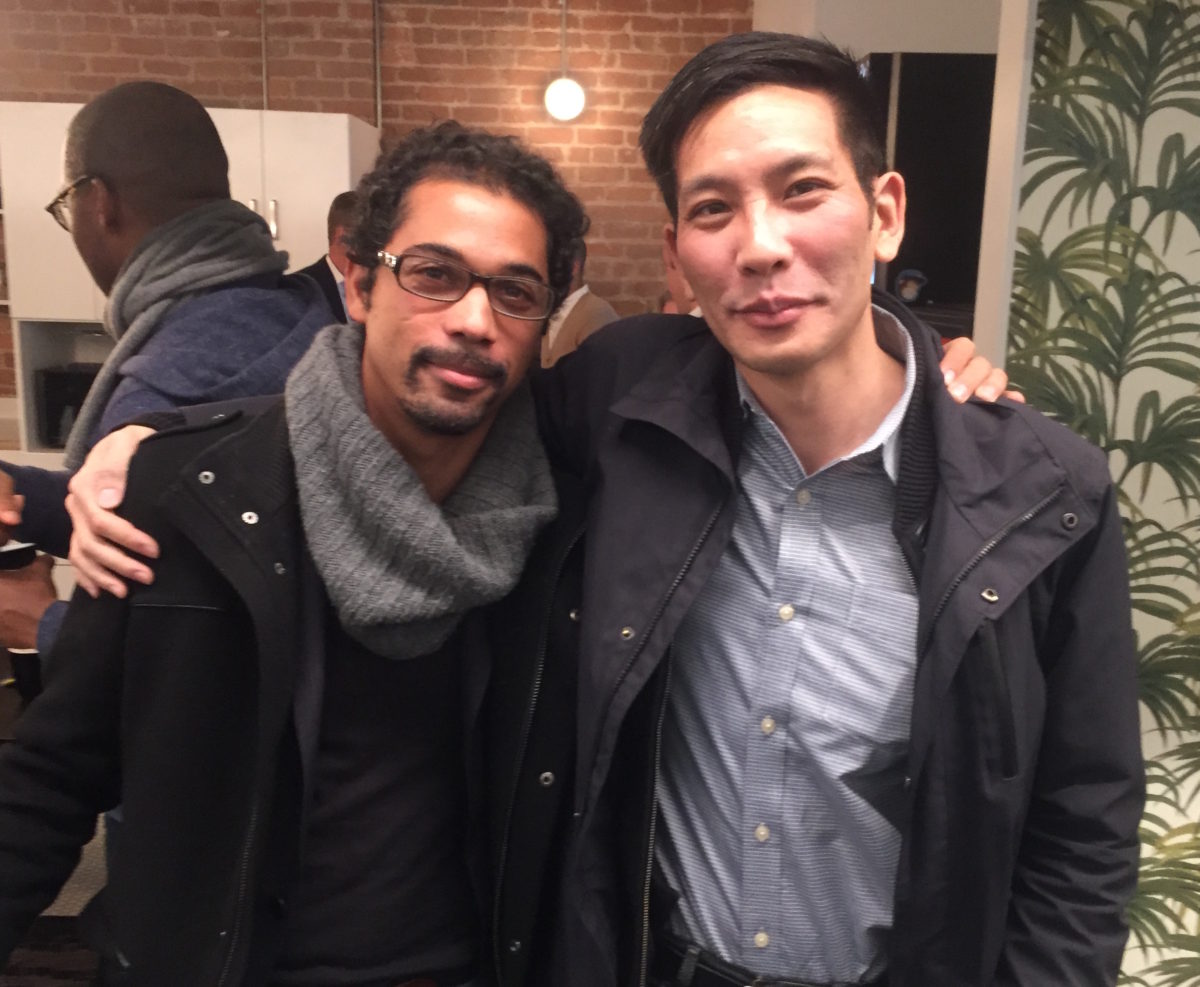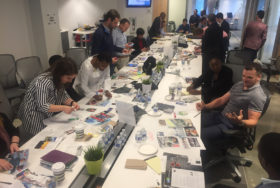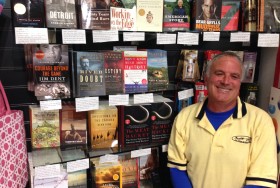
San Francisco is experiencing a gold rush. Tech and business prospectors are flocking here from all over the world to find their fortune. Competition is cutthroat for jobs, internships, venture capital – you name it. Apartments are hard to find and insanely expensive. Cracking the human code in this tech-crazed boom town can seem as tricky as getting a break in Hollywood. Meet Eric Quon Lee, a Canadian immigrant who just may be the superconnector you need.
【如果您想看中文版,请跳到最底页】
Networking is one of those career building blocks that technology was supposed to automate. Create your LinkedIn profile, hit enough of those tech meet-ups, and you’ll strike networking gold, right? Not so fast, it turns out. Who really believes the leviathan LinkedIn, recently acquired by Microsoft, serves much more than our professional vanity? People link in with you, you link in with them, and the vast majority of the time there’s no action. No email exchange, no conversation, no in-person meeting, no clear value – nothing more than an invisible data point in your march past the vaunted 500 connections.
That’s where Eric Quon Lee fits in. This is a man with empathy for what it’s like to be the new guy in town. Born in Canada to Chinese immigrants, Eric might have been an engineer. He loved taking apart toys and machines and was coding at an early age. Speaking only Cantonese as a boy, he had to take remedial English classes to catch up. Eric didn’t compete in sports, and never fit in with his high school’s cliques. His parents were very controlling – Tiger Mom was in charge – and ironically, this may have seeded a latent inclination to network. “They wanted to vet everything,” said Eric. “I never felt comfortable bringing my friends over.” At the University of Toronto, he studied computer science, earned a degree in political science, and then an MBA from the Rotman School of Management. In Canada, he logged a series of prestigious early positions – at Research In Motion, Bombardier Aerospace, and then as a senior consultant at Deloitte. Yet, he continued to see himself as an introvert. He was shy and he rarely networked.
Then came an international consulting job with Deutsche Telekom based in San Francisco. Eric’s new position demanded that he scout startups and technologies, forcing him to get out and meet people at the city’s many tech and startup events. He was often asked to moderate tech talks and even present, but he still didn’t feel he’d really found his value proposition.
Then two years down the road, in 2013, it came to him. He was smack in the middle San Francisco’s flourishing tech ecosystem, “making all these great connections” and he realized he kept meeting and running into colleagues and friends who all seemed to be launching startups, making strategic business decisions or career moves, looking for people and capital. He thought: “Why not put these people together?”
It happened naturally. “I’d hear the same themes, the same needs,” he said. “Oh, I know that individual. Why don’t I just introduce them?” Eric developed an intuitive sense of who needed to meet whom, of where he could generate the most human capital. Interestingly, despite being tech savvy, this wasn’t about creating a networking database. Eric began training himself to create and store what he calls a “mental three-by-five index card” for each interesting person he meets. “It’s not a total representation of that individual,” he says, but rather the two or three most salient aspects of their talents and focus.
If you’re that individual, Eric will make ten to twenty introductions via email. He’ll describe each person and why it would be mutually beneficial for them to meet, and often concludes with the line: “I’ll let the two of you continue the conversation.”
This entrepreneurial human facilitation wasn’t part of his job at Deutsche Telekom, nor is it part of his responsibilities today as a Director at Visa Performance Solutions, where he works with clients and partners on strategic financial and operations logistics. Some people love working out or pursuing hobbies. Eric’s thing is to help people connect. “I feel that in building the network, I’m giving back,” he said. “By helping an acquaintance, I’m building a society. Instead of being the roadblock, I’m the grease.”
Eric believes San Francisco’s edge is curiosity. “Everyone here is willing to take that first meeting,” he explains. “If you prove yourself in that first meeting, I’ll keep talking to you.” And perhaps the reason Eric keeps talking and emailing with so many hundreds of people is that he does get something out of his role. “It’s how I learn. You can read and take courses, but the stuff is (quickly) outdated. That’s why I talk to startup founders. They know their businesses. They live it and breath it.”
Not long ago, a few months after meeting Eric and receiving my fifteen-introduction blast, I brought a friend to a bustling 500-person-plus launch party at the expansive Swissnex tech hub on Pier 17 in San Francisco. I knew nobody at the event other than Dominic Sutter, Swissnex’s Startup Program Manager. When I spotted him in the crowd, and approached to say thank you – lo and behold, Dominic was engaged in conversation with none other than Eric Quon Lee. The two had just met, but the following week Dominic reported that Eric had switched on his human connection mental card catalogue, and blasted out fifteen introductions. At the party, my friend and I chatted with Eric briefly, and my friend proceeded to introduce him to two fellow Canadians, whom Eric seemed tickled to meet.
As we turned to leave, we heard Eric say to them, “How can I help you?” One person at a time, Eric was making another human connection.
旧金山的人脉中间人:Eric Quon Lee (Translation by Haosheng Wang 由王豪盛翻译)
旧金山正在经历一场掘金热。科技和商业领域的淘金者门从世界各地拥拥而至来寻找他们的宝藏。激烈的竞争随处可见从工作岗位,实习,风投等等(Competition is cutthroat for jobs)。住房问题变得越来越难而房价也早已经疯狂的上涨。 想要在这座正在上演科技热的城市中寻得人脉的奥秘就如同想要在好莱坞成为明星一般困难。 他是Eric Quon Lee,一位加拿大移民可能就是你所需要的超级人脉中间人。
社交已是建立个人职业生涯中不可或缺的部分并且许多人认为社交随着科技的进步已经自动化了。建立你的领英账户,参加足够的科技会面然后你就可以获得社交圈的金矿了吗?好像没有那么容易,那些对领英——这家刚刚被微软收购的公司深信不疑的人,领英给他们提供了许多职场虚荣心。人们在领英上与你建立联系,然后你又与他们建立联系以后便再也没有下一步行动了。 不会交换邮件,没有交流,没有面对面的见面,没有清晰的价值——在这场争取累积到500个联系人以上的战争中无非就是一堆数字。
这时候正是我们需要像Eric Quon Lee这样的人的存在。 这位充满了同理心的人就像是这个城市的一股新风。 Eric出生于加拿大来自一个中国移民家庭,他曾经想成为一位工程师。在他很小的时候喜欢拆卸玩具和机器并且编程。小时候的Eric只会讲广东话,他必须恶补英语课来追赶学校课业的进度。他不参与体育竞技,也从未融入他高中的圈子。他的父母管他非常严格——属虎的母亲掌管着全家——具有讽刺意味的是这可能为Eric种下了一颗有着社交倾向的种子。“我父母想要掌控所有的事情”Eric说“我一直觉得带朋友回家玩非常不妥”。而后在多伦多大学他学习了计算机科学,获得了政治科学的学位然后再ROtman管理学院获得了MBA学位。 他的早期职业生涯就经历了一系列富有声望的公司喝职位例如黑莓,庞巴迪公司而后再德勤担任资深顾问。虽然经历了那么多但是Eric依然认为自己是内向的因为他很害羞几乎不社交。
而后因为他担任了国际顾问一职在旧金山的德国电信总部Eric的新职位需要他去发掘一系列的初创公司和科技,强迫他必须出席许许多多旧金山的科技和创业活动来不断认识新的人。他也经常被许多科技活动邀请主持和演讲但是他并没有觉得他能从中找寻到自己的价值。
时间过得很快在他入职两年后的2013年,他意识到他已处在旧金山蓬勃发展的高科技生态圈的正中央正因为“建立了这些出色的关系“他发现他在不断碰到许多以前的同事和朋友们而且她们都在开初创公司,在做策略性的商业选择和事业变迁,寻找着人才和资本。Eric就在想“我为什么不可以介绍这些人认识?” 随后的一切发生的非常自然,“我听到很多相似的主题和需求,“Eric便会与他会面的人或朋友说”我认识那个人,我来介绍你们认识吧。” 久而久之Eric建立了一种直觉关于谁该认识谁。非常有趣的是,尽管他精通科技,可是他并没有去创造一个社交信息库。Eric开始锻炼他自己建立并储存一个叫做“内心3X5卡片”每当他遇到一个有趣的人的时候他就会记住两到三点这个人尤为突出的才能和专攻在他的心里的“3X5卡片”上。
如果你是这样的人,Eric会通过邮件介绍你给十到二十个人认识。他会解释为什么每个他介绍的人值得认识并且会对双方带来互利,而后他经常会在邮件的最后加上一句“现在我让你们继续这段对话。”他所做的这一切并不属于他在德国电信的本职范围,也不是他现在作为VISA性能解决方案主管的责任。许多人乐忠与自己的爱好,Eric的爱好便是帮助人们互相认识。“我觉得在建立自己社交圈的时候我也在回报它。”Eric说“ 通过帮助相识的人,我在建立一个社群,而不是成为一个路障,我便是这个社群的润滑油。“
Eric坚信旧金山的优势是好奇心。“所有人在这里都愿意出来进行第一次会面,”他介绍道。“如果你在第一次会面的时候证明了你自己,我会继续与你交流。”可能Eric一直坚持与成百上千的人交流和邮件来往的同时自己也能收获许多。“这就是我学习的方法,你可以阅读和上课,但是很多事情会迅速的过时。这也是为什么我与初创公司创始人一直在交流。他们了解他们所做的,他们活在其中。”
就在不久前,在我第一次与Eric见面后的几个月中我也收到了我的15封介绍邮件,我带了一个朋友去参加一个超过五百人的庞大而且昂贵的瑞士科技中心开业典礼(Swissnex tech hub on Pier 17 in San Francisco.)在那个活动除了Dominic Sutter(瑞士初创公司项目主管)以外的人我都不认识。偶然间我发现了Eric在众人之中,我便走上前去想要感谢他的介绍真没想到Dominic正在和Eric密切的交谈。他们两个刚刚认识但是后面的一周Dominic告诉我Eric已经给他发了15封介绍邮件显而易见Dominic打开了Eric的社交圈开关和内心“3X5卡片”。 在开业典礼结束后我和我的朋友简短的与Eric交流了一会儿,而后我的朋友介绍了两位让Eric非常感兴趣的加拿大人给他认识。
在我们转身离开时我们听到Eric在与他们交流并且说到“我该如何帮你们?” 一个人接一个,Eric又在连接不同的人认识。


